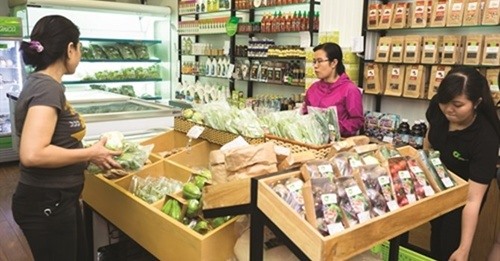 Economy
Economy

Improving the regional link and developing the supply chain are necessary for the Cửu Long (Mekong) Delta to boost efficiency in agricultural production and national food security.
 |
| Customers purchase organic foods. Improving the regional link and developing the supply chain are necessary for the Cuu Long (Mekong) Delta to boost efficiency in agricultural production and national food security. — Photo bizlive.vn |
HÀ NỘI – Improving the regional link and developing the supply chain are necessary for the Cửu Long (Mekong) Delta to boost efficiency in agricultural production and national food security.
Experts of CEL Consulting specialising in supply chains in South East Asia said the region contributes more than 50 per cent of the country’s food output, but farmers’ income remain low and food processing and export firms continue to struggle, Hải Quan (Customs) newspaper reported.
According to CEL Consulting, this is due to the shortcomings of a sloppy supply chain.
Currently, the agricultural sector’s supply chain still has to go through many intermediaries.
More than 90 per cent of farmers rely on intermediaries as the only source of market information and the only purchasers.
In addition, firms do not have direct interaction with farmers, so they fail to manage the supply, experts said.
Julien Brun, director of CEL Consulting, was quoted by the newspaper as saying that the future of the region’s agricultural production would be centralised production, which would require improvements in both the scale of production and the regional link.
Under this model, firms would help direct farming production following the market demand, develop brand for agricultural products and apply technologies in production.
Intermediaries should simply play the role of logistics service providers, according to Julien. The development of a distribution network was also essential, he said.
The region must increase rice output from 21 million tonnes per year to 22.1 million tonnes and fishery output by 28 per cent by 2020 to meet national food security. — VNS




